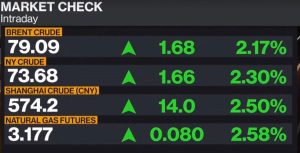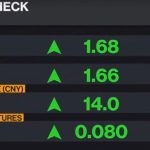Oil Rises as Strikes Against Houthis Raise Middle East Risks
Oil rose after the US and its allies launched airstrikes against Houthi rebels in Yemen, retaliating for attacks on ships in the Red Sea that have imperiled flows of fuel and goods through the vital waterway.

Brent climbed 1.1% to settle above $78 a barrel, while West Texas Intermediate advanced to settle above $72 a barrel. Prices spiked even higher early in the session before paring gains alongside equities as investors gauged whether the escalation will spark a broader conflict in the Middle East.
President Joe Biden said on Thursday that strikes had been conducted against a number of targets used by the Iran-backed group. The move had an immediate impact on shipping, with at least one major tanker owner saying it has paused voyages. In response, the Houthis said all US and UK interests are now legitimate targets.
Global benchmark Brent is now testing its 50-day moving average for the first time since October. If prices breach the level, it could spur additional buying by algorithms and technical traders.
“Energy markets have been significantly underpriced for the ongoing rise in geopolitical risks,” said Dan Ghali, a commodity strategist at TD Securities. If Brent ends up breaking above $81 a barrel, it could propel buying and “ force algos to start acquiring net long positions.”
Earlier this week, Houthis had launched their largest assault to date on shipping in the Red Sea, prompting warnings of retaliation from Washington. Iran also seized a tanker off the coast of Oman, further inflaming the situation. Tensions in the Middle East have been rising since Hamas’s attack on Israel on Oct. 7. The Houthis started attacking ships in mid-November, ostensibly in support of Hamas, and have said they won’t back down until Israel ends its assault on Gaza.
The assaults prompted many commercial shippers to redirect vessels around the southern tip of Africa, rather than risk a passage through the waterway that links to the Suez Canal. Until now, oil tanker markets had largely avoided the worst of that impact.
Traders are keeping a close eye on whether Iran will be drawn into the conflict as it could threaten oil supplies in a region that produces a third of the world’s crude. The war-risk premium had previously been easing amid ample output from non-OPEC+ producers and slowing demand growth.







